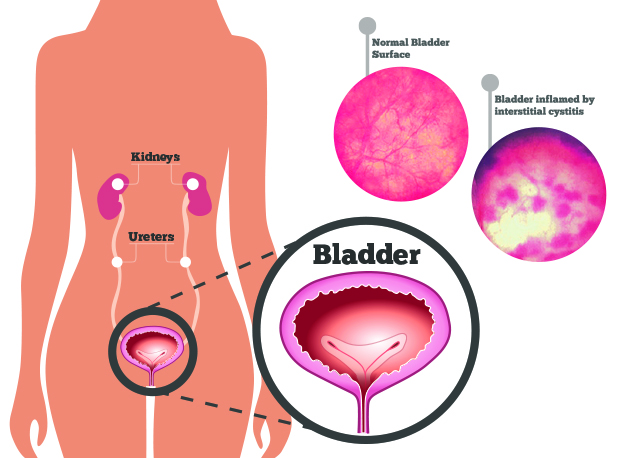If bladder stones are not detected and treated early, they can lead to serious complications that pose risks to the patient’s health. So, what are the possible complications of bladder stones? Let’s find out how to take preventive measures as early as possible.
How do bladder stones form?
The bladder, located in the lower abdomen, is an elastic organ composed of smooth muscle fibers and controlled by a complex nervous system that regulates the storage and excretion of urine.
Bladder stones may originate from the kidneys or ureters. Small stones that pass down from the upper urinary tract can sometimes be expelled naturally through urination, while larger stones may remain in the bladder and continue to grow as mineral deposits accumulate on their surface.
In some cases, bladder stones form directly within the bladder. This may occur due to long-term medication use that leads to the precipitation of minerals, or from excessive intake of calcium, phosphorus, or other minerals, which increases the risk of stone formation.
Bladder stones can also develop as a secondary condition resulting from underlying bladder disorders such as diverticula, chronic inflammation, or infection, or from bladder outlet obstruction — commonly seen in men with benign prostatic hyperplasia (BPH), prostatitis, urethral stricture, or foreign bodies in the bladder. These conditions cause urinary retention and sediment accumulation, which gradually lead to the formation of bladder stones.

In addition, inadequate water intake and a diet low in vegetables and soups can lead to urinary stasis and the accumulation of mineral deposits, contributing to bladder stone formation.
A person with bladder stones may have either a single stone or multiple stones. Their sizes vary — some as small as a corn kernel, others as large as a fingertip, and in some cases, stones can grow as big as a chicken egg or even larger.
Complications of bladder stones
The severity of bladder stone complications depends on the number and size of the stones. Small stones that do not cause bladder inflammation or urinary obstruction may not produce noticeable symptoms and are often detected incidentally during ultrasound or X-ray imaging.
Bladder inflammation
Bladder stones can cause cystitis (bladder inflammation) when they repeatedly rub against the bladder lining during contraction. This friction leads to ulceration, tissue damage, and infection, and in some cases may even cause bleeding.

If acute cystitis is not treated promptly, it can progress to chronic inflammation, which is difficult to cure and may lead to bladder shrinkage or fistula formation due to constant changes in urine volume inside the bladder.
Reader may also be interested in:
- Early symptoms of kidney stones to recognize and effective treatment methods for kidney stones
- Urolithiasis: Everything you need to know from A to Z
Pyelonephritis and renal failure
Bladder stones can lead to kidney infection (pyelonephritis) and renal failure due to ascending bacterial infection. This complication can be life-threatening if not treated promptly.
In addition, large stones may compress and obstruct the bladder neck, causing persistent lower abdominal pain that can radiate to the genital area or perineum.
Bladder or perineal fistula may also occur as a complication of bladder stones. In severe cases, large stones can cause complete urinary retention, leading to urine accumulation in the bladder, bladder distension, and visible swelling above the pubic bone.
Principles of bladder stone treatment
To prevent dangerous complications, bladder stones should be detected and treated early. When experiencing symptoms such as frequent urination, painful urination, or lower abdominal pain, patients should seek medical examination promptly for accurate diagnosis. Delayed diagnosis may lead to severe complications and increase both treatment cost and duration.
In terms of treatment principles, small bladder stones may be managed medically using medications that help gradually dissolve the stones, combined with increased water intake to promote natural stone passage through urination. In addition, antibiotics may be prescribed to prevent or control urinary tract infections.

For large stones, surgical removal or lithotripsy should be performed as soon as possible. Both medical and surgical treatments must follow the doctor’s instructions, and patients should not self-medicate.
Prevention of bladder stones
If not detected and treated early, bladder stones can lead to serious complications. Therefore, prevention from the onset is the best way to protect health and avoid such risks.
It is recommended to drink at least 2 liters of water daily and avoid holding urine, as this habit can cause sediment accumulation in the bladder, leading to stone formation. In addition, regular health check-ups are essential, especially when experiencing abnormal symptoms such as painful urination, frequent urination, or lower abdominal pain, to ensure early detection and timely treatment.
Hong Ngoc General Hospital – A leading center for advanced bladder stone treatment
With state-of-the-art medical technology that enables safe and complete stone removal without open surgery, Hong Ngoc General Hospital has become a trusted destination for the treatment of bladder stones.
The hospital’s team of highly qualified and experienced urologists has many years of expertise in applying advanced techniques for non-invasive lithotripsy, providing patients with the most effective and safe treatment plans — no open surgery, no scarring, and rapid recovery.
In addition, patients at Hong Ngoc General Hospital receive comprehensive, personalized care and enjoy 5-star hotel-standard inpatient facilities equipped with full modern amenities, ensuring comfort throughout the treatment and recovery process.
Note: The information provided in this article by Hong Ngoc General Hospital is for reference only and should not replace professional medical diagnosis or treatment. Patients are advised not to self-medicate. To accurately determine your condition, please visit the hospital for direct examination, diagnosis, and appropriate treatment planning by qualified physicians.
Follow the official Facebook fanpage of Hong Ngoc General Hospital [HERE] to receive more useful health information and updates on the hospital’s special promotions and wellness programs.











